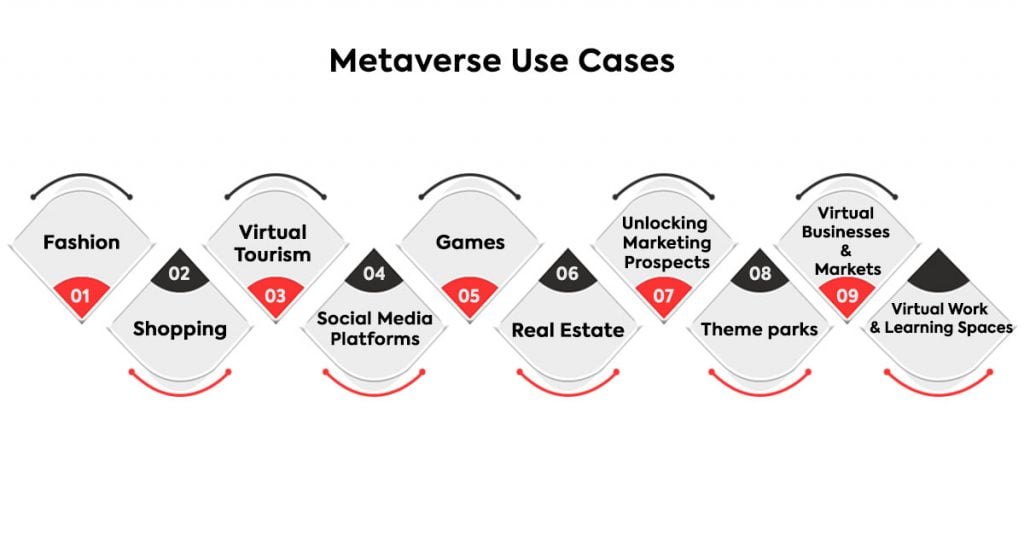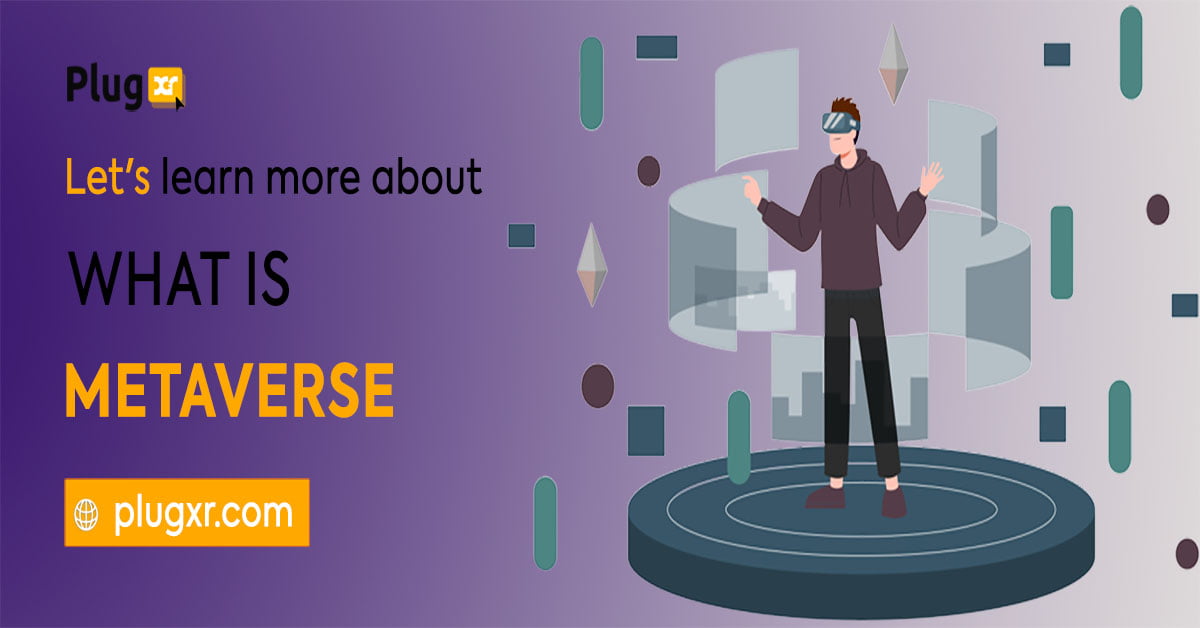The metaverse concept has already spread to the business market and captured the imagination of leaders in the innovative technologies sector. It has captured several metaverse use cases like virtual reality games, business, education, social projects, fashion, and even the real estate market.
Many iterations have gone into creating a metaverse. The concept evolved from augmented reality or VR-powered games to a world where imagery and social media can coexist. The technological realization of a metaverse is just beginning, and large players like Meta are experimenting with the concept. However, a new crop of startups emerging from the world of cryptocurrency is now looking for ways to expand their digital communities. Metaverse projects are already impacting how we interact with the internet. Here we will look at a few of the most popular metaverse use cases and talk about how implementing VR technology can help your company prepare for the coming metaverse era.
What is Metaverse?
Metaverse is the virtual space within digital environments like social media, online games, and virtual reality. It is the combination of the prefix “meta,” which means “beyond,” and the stem “universe.” The Metaverse, as coined by Neal Stephenson, is, in fact, science fiction. In his 1992 novel Snow Crash, he discussed it in depth, in which characters wear virtual reality headsets and interact in a game-like digital world. It is a fantastical vision of the future that tech giants like Facebook founder Mark Zuckerberg are betting on as the next great leap in the evolution of the internet. It refers to shared virtual worlds in which land, buildings, avatars, and even names can be purchased and sold, frequently with cryptocurrency. People can walk around with their friends in these environments, visit buildings, buy goods and services, and attend events.
What are the Metaverse Use cases?
You must be eager to discover its applications with a basic understanding of the Metaverse and why it is suddenly gaining popularity. Here are a few of the popular applications for the Metaverse.

Fashion
Being one of the most progressive sectors of the economy, the fashion industry is actively introducing new trends related to metaverse use cases. Gucci is the most notable example, having created this meta-design category on Roblox. Users can purchase exclusive outfits from well-known fashion houses on the gaming platform. A digital Gucci bag was recently sold on the platform for $4,000, indicating that the virtual fashion industry is already a significant source of profit for the leading market players. Looking at the growing popularity of NFTs, the day will soon come when all famous fashion houses’ exclusive virtual collections will be sold for millions of dollars on numerous fashion websites and in virtual boutiques.
Shopping
Many entrepreneurs today are excited about the potential of this metaverse use case, predicting that online shopping will soon transform from a two-dimensional interaction to an incredible virtual experience. This experience will be free from any physical world’s constraints, but it will retain its benefits, such as the ability to try on, feel, and test the product or get online advice from the seller. Zara has released its first collection of avatars and people. Its physical and virtual models are now available at network stores worldwide. The collection was created in collaboration with Ader Error, a South Korean clothing brand. Nike has also gotten on board with virtual goods. Nikeland, a virtual showroom on the Roblox gaming platform where visitors can dress up their avatars in Nike apparel and shoes, has already opened.
Virtual Tourism
Virtual tourism is another good answer to the use cases of the metaverse. Technology has now upscaled to the point where you can enjoy the experience of traveling without physically visiting the destinations. The first-person perspective is the primary distinction between visiting a location in person and watching it on video. Virtual and augmented reality can be combined to create an immersive digital environment. You can now have the perfect platform for elevating the audience’s imagination with immersive digital reality featuring realistic content. Therefore they can experience the location as if they were physically present.
Expansion of social media platforms
Mark Zuckerberg and the creators of Meta platforms recognize that technology can do much more than connect people through social media. Their concept of embracing this technology is to create a three-dimensional space that isn’t limited to watching people on a computer or mobile screen and listening to their voices. A Metaverse-based platform provides a more immersive experience for social media users by implementing a sense of presence among them.
Games
The gaming industry is one of metaverse technology’s primary use cases. It is not surprising that metaverse technology was first used in computer games, allowing players to interact with several participants in a single virtual interoperable environment. The Metaverse’s goal is to captivate users and make them believe they are true; in reality, they have entered. It helps to take those collaborative possibilities to the next level by immersing users in a three-dimensional environment where they can interact more personally with the elements around them rather than on a two-dimensional screen. It is an excellent method for creating augmented reality when working with games, play-to-earn gaming with NFTs minting and trading, live game streaming, and value exchange with crypto.
Real Estate
Although it may appear contradictory, real estate is also one of the thriving metaverse use cases… Companies such as Decentraland sell virtual plots of “land” that businesses can use to build a virtual headquarters or create online experiences for employees or clients. Traditionally, metaverse technology can potentially benefit real estate agents working with remote sellers. For example, people could do a virtual reality walkthrough of a home they want to buy or rent across the country or test out potential paint colors in their new house while it is still being constructed.
Unlocking marketing prospects
The Metaverse provides a virtual world in which users participate in various activities as their digital avatars. Brands could take advantage of exclusive marketing opportunities in the Metaverse’s various virtual worlds. Many brands have successfully tapped into the Metaverse’s marketing opportunities.
Theme parks
Theme parks and entertainment venues can transport visitors into their respective worlds. Beloved characters walk alongside families and guide visitors around the park, passing the baton to their virtual friends in different areas in one of these metaverse use cases. Most children can be found and returned to a safe location by their favorite AR buddy. Rides are improved by augmenting physical experiences with digital technology. Home movies are transformed from 2D passive media into enhanced theme park Vacation Experiences – once returned home, visitors can participate in fully immersive recreations of their trip, complete with virtual interactions within the venue universe.
Virtual businesses and markets
Technology opens up new business opportunities, allowing them to promote their services and offerings effectively. With the growing usage of the Metaverse, businesses are moving away from the two-dimensional surface of e-commerce and into lifelike virtualized spaces for a more immersive experience. Owners of e-commerce businesses can interact with merchants in a virtual space and conduct trading formalities such as product inspection, negotiations, and deal closing. Furthermore, they can better influence customers by creating interactive and realistic marketing content rather than relying on digital marketing tactics.
Virtual work and learning spaces
The COVID-19 pandemic has compelled global businesses to switch to digital communication methods. Platforms for video conferencing have also grown in popularity for remote work, online classes, and other work-from-home arrangements. Because of real-time audio and video interaction, these platforms fail to provide a compelling, engaging experience. Metaverse addresses this limitation by providing users with a more engaging experience through its graphically rich virtual environment, 3-D avatars, and immersive meetings. The Metaverse lets us navigate a virtual environment with lifelike participant avatars rather than seeing them on a computer screen and communicating through microphones.

Who are the key players in Metaverse?
Meta
Facebook-turned Meta’s first foray into meta Horizon Worlds became available to adults in North America in December. The monthly user count of Horizon Worlds and Horizon Venues has increased tenfold this month to 300,000 people. Even though Meta refers to Horizon Worlds and Horizon Venues as social VR platforms rather than a metaverse, Mark Zuckerberg claims that the Horizon software is central to Meta’s metaverse vision.
Sandbox
The Sandbox, owned by Hong Kong-based game developer Animoca Brands, has over 40 million downloads and 1 million monthly active users. The Sandbox is a community-focused metaverse built on the Ethereum blockchain that issues its in-metaverse cryptocurrency, SAND, which is currently priced at around three US dollars. It also offers digital real estate in the form of an NFT called LAND. The players can profit by buying, selling, or renting out the LANDs.
Microsoft
Microsoft is not falling behind as a major technology player by demonstrating grand plans for meta technology. As a prelude to securing a significant position in the Metaverse, the company announced the acquisition of Activision Blizzard, the massive video game developer, and publisher. This acquisition will help Microsoft’s gaming business grow across mobile, PC, console, and cloud platforms and provide foundational elements for the Metaverse.
PlugXR
PlugXR is a new blooming Web 3.0 company based in Sunnyvale, USA with an innovative reality. It has partnered with reputable companies to provide a platform for users to create iOS and Android apps without coding. It is supported by a powerful 3D visualization experience that takes less than 5 minutes to create and includes SDKs for all platforms. With its global platform, PlugXR is the most effective yet profitable platform for small to large businesses. PlugXR creator immerses users in developing Metaverse, Augmented Reality, Virtual Reality, and Mixed Reality for Android, iOS, and WebAR with its no-code cloud platform.
Decentraland
Decentraland is currently one of the most well-known metaverses. Decentraland, released in February 2020, had around 300,000 monthly active users at the end of last year. The Decentraland metaverse is free to play and built on the Ethereum blockchain. To get the full experience, users must connect their accounts to their digital wallets. According to CoinGecko, the virtual platform has its cryptocurrency, MANA, which is currently the 34th most traded cryptocurrency with a market cap of $3.45 billion.
Final Thoughts
The Metaverse use cases are not limited to the gaming and entertainment industries. As we approach the era of the Metaverse, businesses in all domains must begin preparing for the new opportunities and challenges that this new era will bring. Companies can gain a competitive advantage and be ready to capitalize on the new opportunities that they will bring by implementing immersive solutions. Companies are investing heavily in creating out-of-the-box customer experiences in the next phase of the internet. Over time, we will see many such applications that will revolutionize how we work, collaborate, and socialize with one another. PlugXR helps to bring your idea to life, from mobile applications to complex cross-platform corporate projects with our easy-to-use no-code platform.

